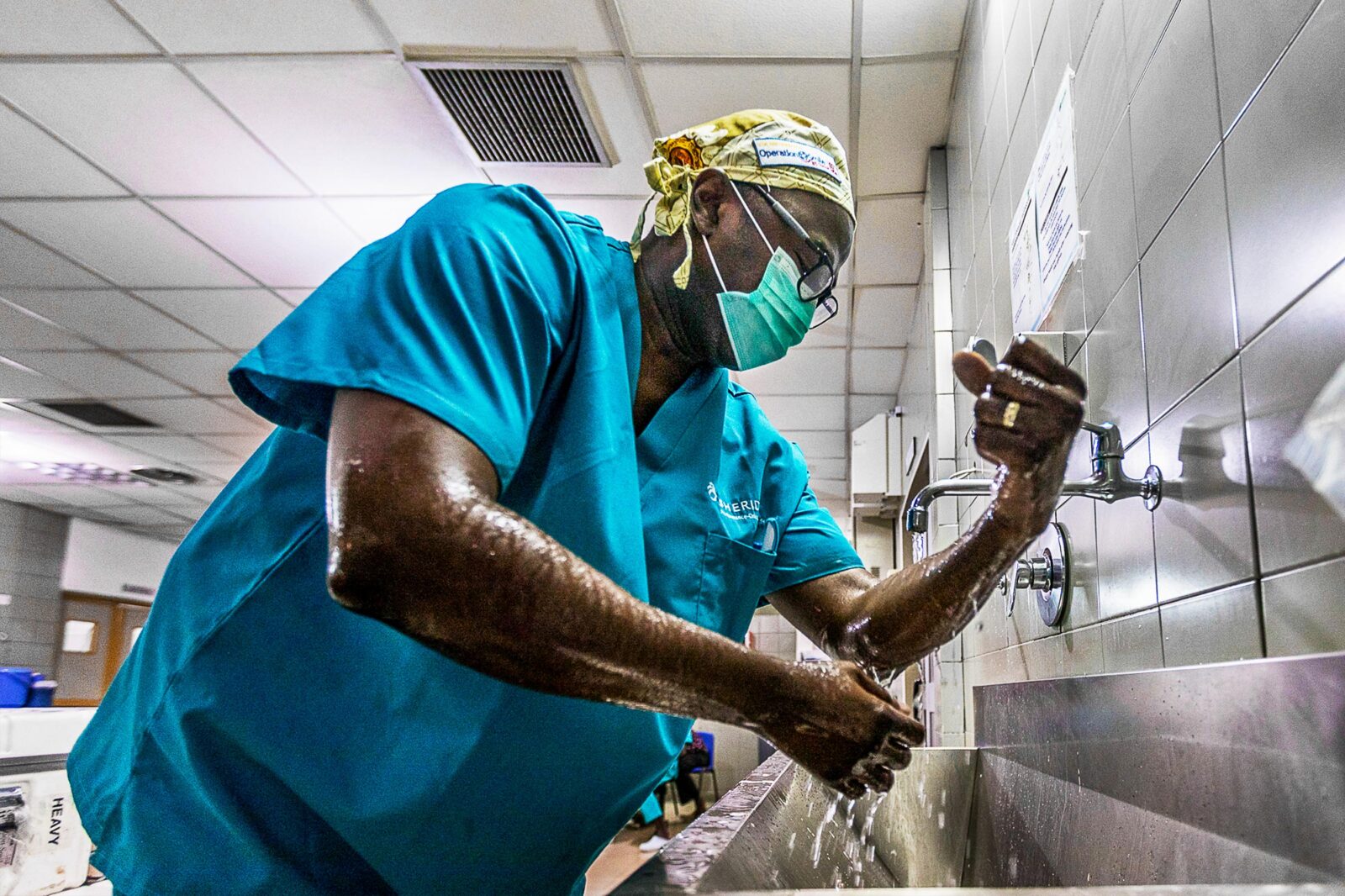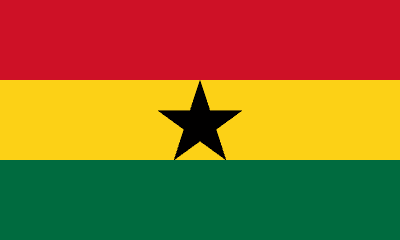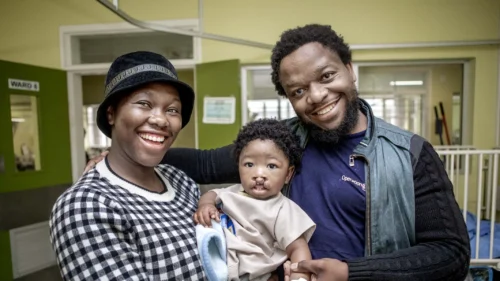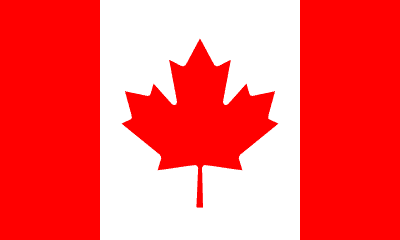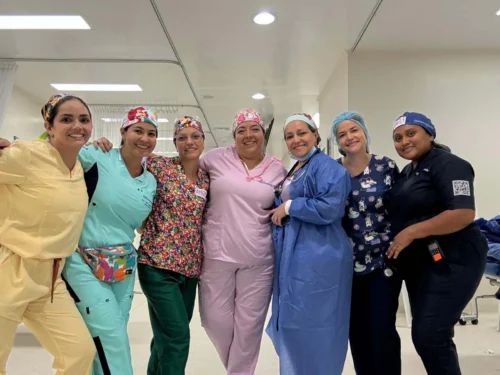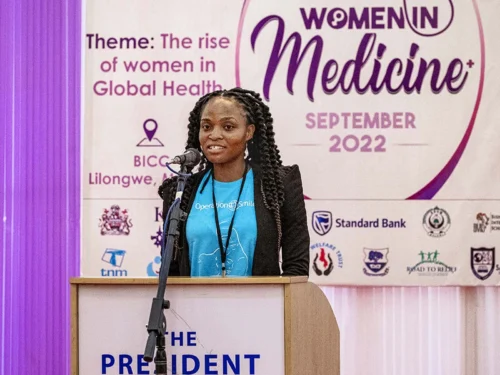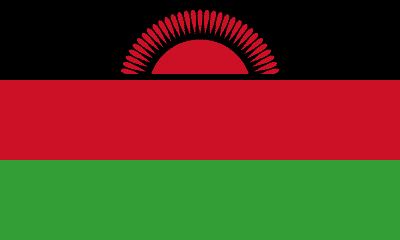Dr. Opoku Ampomah walks side by side with his patient, 17-year-old Faustina, down the corridor that leads to the operating rooms at Eastern Regional Hospital in Koforidua, Ghana.
It’s the final day of surgeries during Operation Smile Ghana’s first local medical mission in January 2018, and she’s the first patient on whom he will operate today. Born with a cleft lip, Faustina has spent most of her days at her family’s home in a rural village in Ghana’s Western Region. Aside from her cousins and younger siblings, she has no friends and knows that people point her out and whisper to each other about her appearance when she ventures out into public.
With a fatherly presence and a calm, confident and soothing delivery, Opoku explains everything that Faustina can expect throughout her procedure in their local language of Twi. She reflects his tone, nodding in understanding and smiling as Opoku prepares to change the trajectory of her life within the next hour.
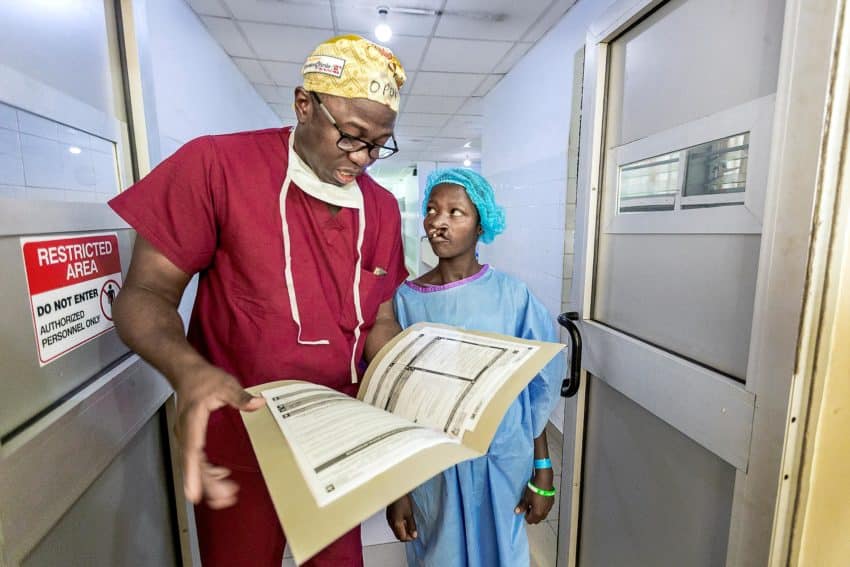
These are special moments shared between the master cleft surgeon and his patient. They’re also emblematic of the milestone that Opoku has helped to usher in as the medical director of Operation Smile Ghana. For the first time in the history of Operation Smile’s work in the country, nearly every medical volunteer position on a mission has been filled by a Ghanaian medical professional.
“The first mission in Ghana for Operation Smile was in 2011, and it was composed entirely of foreign volunteers,” Opoku says. “As you can see, in the span of about seven years, we have been able to progress to the point where we’ve built up the local capacity of the whole gamut of specialties that make a mission successful.”
As the director of the National Reconstructive Plastic Surgery and Burn Centre at Korle Bu Teaching Hospital in Accra, many of Operation Smile Ghana’s medical volunteers have emerged from under his leadership. Through the trust he’s built within the Ghanaian medical community, Operation Smile has been able to expand its reach and influence throughout the country.
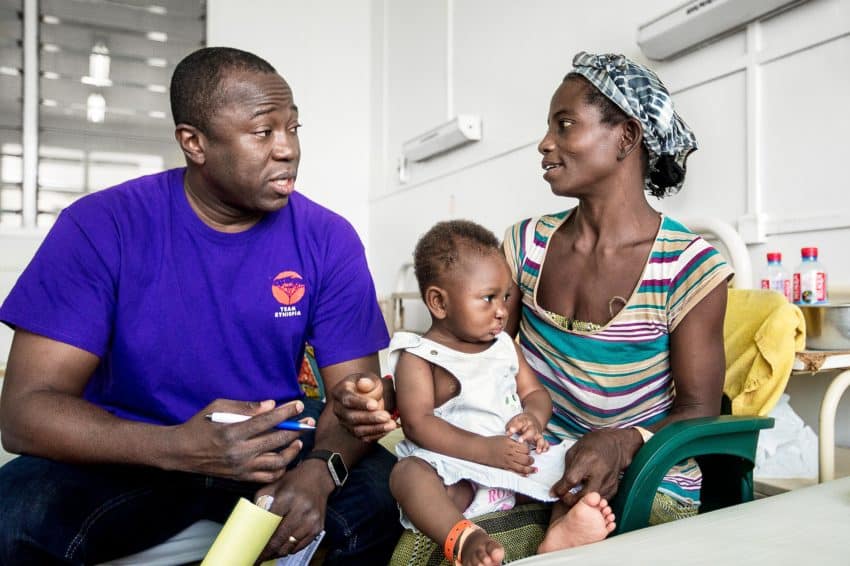
“The advantage of having someone like me around is that I know most of the heads of these hospitals; they’re my colleagues or friends,” Opoku says. “Because if you come in as (a foreign nongovernmental organization), then they’re going to look at you through that lens. They may not open up as much as they could. But if they feel that, ‘Oh, one of ours is part of it,’ or their local people are part of this thing, then it becomes our thing. That connection, it makes things easier. And that’s what has actually helped us a lot.”
Case in point: Opoku went to high school and medical school with the director of Eastern Regional Hospital, the site of this groundbreaking mission and the previous international medical mission held in November 2017.
However, Opoku hadn’t originally set out to become Ghana’s leading reconstructive plastic surgeon.
Two years after Operation Smile began hosting international missions in Ghana – both held in Accra in 2011 and 2012 – Opoku joined the organization as a medical volunteer.
However, he knew that these efforts were only scratching the surface of Ghana’s massive need for cleft surgery.
“Most of the people that we are trying to reach are in the rural areas where there’s not much medical expertise available.” Opoku says. “So, for me, I find it difficult to justify having missions in Accra, the capital, which doesn’t give us a realistic picture of what’s actually going in the country…
“The team agreed, took it on board, and so then the next mission we went to Tamale, which was very successful.”
Another mission to Tamale followed in 2014, but the patient turnout still didn’t reflect the need that was present in the country. Around the same time that Opoku joined Operation Smile, Italian transplant Sabrina Ghiddi became involved as a nonmedical volunteer, assisting the child life specialists on three missions. After the 2014 Tamale mission, Sabrina learned of the possibility that Operation Smile’s work in Ghana could be ending due to low patient turnouts.
Inspired to do more to help, she, along with Clement Ofosuhemeng, mounted aggressive cleft awareness and patient recruitment campaigns ahead of the April 2015 medical mission to Cape Coast. The result was a turnout of more than 400 potential patients, proving that the patients were out there; they just weren’t being reached.
However, the Cape Coast mission was only equipped to provide surgery for 75 patients. While the team was able to stretch its resources to provide 90 surgeries, the mission proved to be bittersweet for Opoku.
“Even during the week of surgery, people kept showing up – they just kept showing up. That was one of the most difficult days in my career, because I had to look at these people in the face – you could see this desperation in their eyes, but there was this hope – and I had to be the bearer of bad news to tell them that, ‘Look, we are sorry that you cannot have surgery.’ That was one of the most heartbreaking things I’ve ever had to do.”
But Cape Coast marked a new beginning.
After that mission, Operation Smile Ghana registered as a domestic nonprofit, and Opoku became its medical director and member of its board. Sabrina, Clement and program coordinator Lucy Apeajei rounded out the full-time staff. Under their leadership, each of the subsequent five international missions conducted saw more than 300 potential patients arrive for comprehensive health evaluations.
The sharp increase in mission activity brought along corresponding investments in the training and education of Ghanaian medical volunteers. The first local mission represents an important step in the development of not only Operation Smile Ghana’s volunteer base, but also the capacity of the country’s health system to help its fellow citizens in need.
“Through this process, two of my newly-qualified plastic surgeons (Drs. Edem Anyigba and Kwame Darko) have become internationally accredited,” says Opoku, adding that there are four more Ghanaian surgeons currently training to become credentialed Operation Smile medical volunteers. “I think it’s fantastic because it’s not just doctors. If you look at the nurses, they’ve received various trainings. Operation Smile has been running (American Heart Association Basic Life Support and Pediatric Advanced Life Support) courses and various other training courses, and the (international) volunteers have also been sharing knowledge and information with them.
“So you can see that this has helped to increase the capacity of the local staff and it’s helping them to deliver better, quality care not just for patients with cleft, but for all of the other patients that they see.”
“As an undergrad, plastic surgery wasn’t even one of the considerations, because at that time, plastic surgery services didn’t exist in this country,” Opoku says. “But during my postgraduate training, I rotated through the units and I thought it was interesting…
“The other thing I looked at was that it wasn’t too technology-intensive in the sense that, with the right skill and knowledge and with very basic instruments, there was a lot you could do to improve somebody’s life more or less in an instant.”
Opoku was among the first graduates of the center that he now leads. A pioneer of the specialty in Ghana, he became only the fifth plastic surgeon in the country’s history. Today, there are 14.
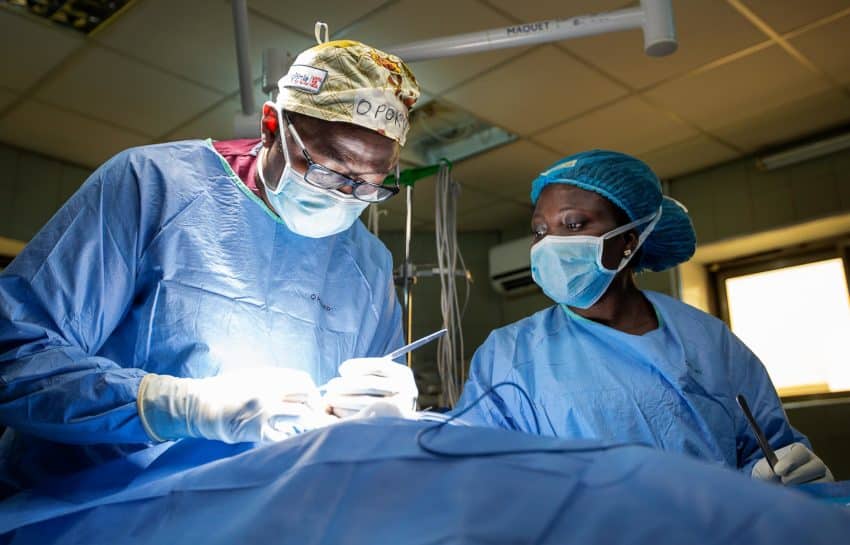
Two years after Operation Smile began hosting international missions in Ghana – both held in Accra in 2011 and 2012 – Opoku joined the organization as a medical volunteer.
However, he knew that these efforts were only scratching the surface of Ghana’s massive need for cleft surgery.
“Most of the people that we are trying to reach are in the rural areas where there’s not much medical expertise available.” Opoku says. “So, for me, I find it difficult to justify having missions in Accra, the capital, which doesn’t give us a realistic picture of what’s actually going in the country…
“The team agreed, took it on board, and so then the next mission we went to Tamale, which was very successful.”
Another mission to Tamale followed in 2014, but the patient turnout still didn’t reflect the need that was present in the country. Around the same time that Opoku joined Operation Smile, Italian transplant Sabrina Ghiddi became involved as a nonmedical volunteer, assisting the child life specialists on three missions. After the 2014 Tamale mission, Sabrina learned of the possibility that Operation Smile’s work in Ghana could be ending due to low patient turnouts.
Inspired to do more to help, she, along with Clement Ofosuhemeng, mounted aggressive cleft awareness and patient recruitment campaigns ahead of the April 2015 medical mission to Cape Coast. The result was a turnout of more than 400 potential patients, proving that the patients were out there; they just weren’t being reached.
However, the Cape Coast mission was only equipped to provide surgery for 75 patients. While the team was able to stretch its resources to provide 90 surgeries, the mission proved to be bittersweet for Opoku.
“Even during the week of surgery, people kept showing up – they just kept showing up. That was one of the most difficult days in my career, because I had to look at these people in the face – you could see this desperation in their eyes, but there was this hope – and I had to be the bearer of bad news to tell them that, ‘Look, we are sorry that you cannot have surgery.’ That was one of the most heartbreaking things I’ve ever had to do.”
But Cape Coast marked a new beginning.
After that mission, Operation Smile Ghana registered as a domestic nonprofit, and Opoku became its medical director and member of its board. Sabrina, Clement and program coordinator Lucy Apeajei rounded out the full-time staff. Under their leadership, each of the subsequent five international missions conducted saw more than 300 potential patients arrive for comprehensive health evaluations.
The sharp increase in mission activity brought along corresponding investments in the training and education of Ghanaian medical volunteers. The first local mission represents an important step in the development of not only Operation Smile Ghana’s volunteer base, but also the capacity of the country’s health system to help its fellow citizens in need.
“Through this process, two of my newly-qualified plastic surgeons (Drs. Edem Anyigba and Kwame Darko) have become internationally accredited,” says Opoku, adding that there are four more Ghanaian surgeons currently training to become credentialed Operation Smile medical volunteers. “I think it’s fantastic because it’s not just doctors. If you look at the nurses, they’ve received various trainings. Operation Smile has been running (American Heart Association Basic Life Support and Pediatric Advanced Life Support) courses and various other training courses, and the (international) volunteers have also been sharing knowledge and information with them.
“So you can see that this has helped to increase the capacity of the local staff and it’s helping them to deliver better, quality care not just for patients with cleft, but for all of the other patients that they see.”

